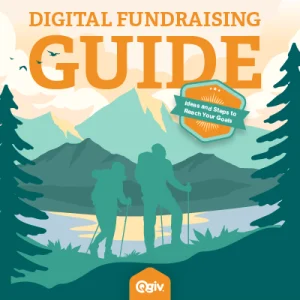Sponsorship letters are one of the best ways to start a conversation between your nonprofit and a potential sponsor about forming a mutually beneficial partnership. Securing sponsorships with for-profit partners is one of the most important steps you can take on your path to reaching your fundraising goals. Besides the direct aid provided by the sponsor, if you tap into a sponsor’s audience of potential givers, you’re even more likely to find fundraising success.
Is your nonprofit ready to secure a sponsor for your next campaign? Check out these sponsorship request letter samples to get inspired!
- What are nonprofit sponsorship letters?
- Nonprofit sponsorship letter best practices and tips
- 10 nonprofit sponsorship letter templates
- Sponsorship letter for events
- Corporate sponsorship letter
- Sponsorship letter for sports
- Sponsorship letter for schools
- Church sponsorship letter
- Food donation request letter
- In-kind sponsorship letter
- Auction item sponsorship letter
- Sponsorship letter for requesting volunteers
- Sponsorship acknowledgement letter
- Getting creative
What are nonprofit sponsorship letters?
Nonprofit sponsorship letters serve as a key tool in initiating and nurturing collaborative relationships with potential sponsors. These personalized letters outline your nonprofit’s mission, programs, and the benefits sponsors can expect in return for their support.
They offer a direct invitation for corporate partners to become valued contributors to the cause, effectively communicating your organization’s value proposition and paving the way for meaningful partnerships that drive positive change.

What can you offer in return for a sponsorship?
In exchange for a sponsorship, your organization can offer a few different benefits to for-profit partners. One of the main benefits you can offer in return for a sponsorship is advertising opportunities. Whether it’s a banner at an event, a feature on your donation website, or their logo on any t-shirts you sell, sponsorships are a great way for the for-profit world to reach new audiences with your donor base.
What is the difference between a nonprofit sponsorship and a corporate donation?
Here are some of the key differences between a nonprofit sponsorship and a corporate donation:
Nonprofit sponsorships
In a nonprofit sponsorship, the sponsor offers financial aid or services to nonprofits in exchange for promotional benefits like acknowledgment in marketing materials or visibility at events. This partnership fosters a mutually beneficial relationship centered on shared values and goals.
Corporate donations
On the other hand, a donation involves a straightforward philanthropic contribution from a company or individual to a nonprofit without any expectation of receiving promotional benefits. These donations, whether monetary or in-kind, are typically driven by the donor’s commitment to social responsibility and community engagement.
Who to ask for sponsorships?
When looking for potential sponsors, research individuals or organizations aligned with your campaign. These can be local businesses, larger corporations, community organizations, philanthropic foundations, or individuals interested in supporting your mission.
Benefits of sponsorships
Here are a few key benefits of sponsorships for your nonprofit:
- Financial support. Sponsors often provide funds or in-kind donations to cover campaign expenses, from venue rentals to equipment, making it easier for you to focus on fundraising.
- Access to new audiences. Your sponsors can share your organization with their audience as well, helping you expand your donor base.
- Potential long-term support. Successful sponsorships can lead to ongoing collaborations beyond your initial campaign that can make your fundraising efforts more sustainable.
- Community engagement. Sponsorships with local businesses or community organizations can help you further connect with your community, which can help you further your mission.
Elements of a sponsorship letter
When writing your sponsorship letters, you don’t want to miss any important details. Here are some key elements to include when writing your sponsorship request letters:
- Introduction
- Description of campaign
- Sponsorship opportunities
- Audience demographics
- Sponsorship levels and associated perks
- Contact information
- Closing
Nonprofit sponsorship letter best practices and tips
Crafting a compelling sponsorship letter is vital for securing support from potential sponsors. It’s not just about asking for funds–it’s about building a meaningful connection and demonstrating the value of partnership. Here are some expert tips to ensure your sponsorship letters hit the mark:
- Personalize, Personalize, Personalize. Address the sponsor by name and ensure all personalization details are accurate. Show that you’ve done your research and understand their interests and values.
- Tailor Your Message. Each sponsor is unique, so tailor your letter to align with their goals, values, and target audience. Highlight how their support can make a tangible impact on your cause.
- Keep It Concise. Respect your sponsor’s time by keeping your letter concise and to the point. Focus on conveying your message clearly without overwhelming them with unnecessary details.
- Empathy is Key. Put yourself in the shoes of the potential sponsor. Understand their perspective, challenges, and motivations. Frame your letter in a way that resonates with their interests and objectives.
- Leadership Endorsement. Have your organization’s leadership, such as the executive director or board chair, sign the letter. This adds credibility and shows commitment to your partnership.
- Utilize Connections. If possible, enlist someone known to the sponsor to write or endorse the letter. A familiar face can strengthen the appeal and credibility of your request.
- Offer Options. Provide sponsors with a range of partnership opportunities to choose from. This could include different sponsorship levels or customizable packages to suit their preferences and budget.
- Highlight Benefits. Clearly outline the benefits of sponsorship, emphasizing the value proposition for the sponsor. Whether it’s brand exposure, community goodwill, or networking opportunities, make it clear what’s in it for them.
- Include a Call to Action. End your letter with a clear call to action, whether it’s scheduling a meeting, requesting more information, or expressing interest in partnership. Make it easy for sponsors to take the next step.
- Thank your nonprofit sponsors. Thanking your sponsors is not just a chance to remind them of the impact they’ve had. It also sets them up for future engagement down the line. And remember, you can get creative with your thank-yous as well. Who knows? Maybe they’ll want to sponsor another event or offer support in other ways!
- Follow Up. Don’t let your letter be a one-off communication. Follow up with potential sponsors to answer any questions, provide additional information, and express gratitude for their consideration.
By following these best practices, you’ll increase the likelihood of securing sponsorships and forging long-lasting partnerships that benefit both your organization and the sponsor.
10 nonprofit sponsorship letter templates
Here are ten sponsorship letter templates you can customize to fit your mission!
1. Sponsorship letter for events
For many corporate sponsors, events hosted by your nonprofit offer a great opportunity to get the word out about their business and reach potential new customers.
As you plan your next fundraising campaign, consider enlisting a business to sponsor one of your fundraising or donor stewardship events. This could entail having them provide staff to help carry out the event, pay for the event venue, or offset the cost of catering.
In your sponsorship request letter, offer them a few ways they can show their support for your cause at your next event. Be sure you include details about how they’ll benefit from their sponsorship! Consider offering perks like including their logo on event signage, shoutouts during event programming, and complimentary tickets for their staff.
Check out this event sponsorship proposal template to inspire your team:
Remember: depending on your nonprofit’s needs, not all event sponsorships will be appropriate.
For example: an animal advocacy group might think twice about soliciting sponsorships from their local meat-packing plant, or a nature conservancy might reconsider partnering with a large development company.
Another tip? Enlisting a corporate sponsor for a peer-to-peer fundraising event is a great way to tap into the company’s audience of potential donors before the event begins. This way, you can maximize the benefit of your partnership in the time leading up to your anchor event.
2. Corporate sponsorship letter
When talking about nonprofit sponsorships, the first thing that typically comes to mind is a traditional corporate sponsorship in which a business signs on as a nonprofit’s sponsor for a set time period.
One of the best ways to partner with a corporate sponsor long-term is to ask them to promote your cause to employees engaging in their matching gifts program.
The sponsor could include a reference to your cause on their corporate philanthropy page, or they could agree to match gifts to your organization at a higher ratio than gifts to other causes. In turn, your nonprofit would include their business on your website as a valued sponsor.
Consider this corporate sponsorship letter sample that emphasizes a matching gifts partnership:
Many corporations have philanthropy programs in place that allocate a certain percentage of their overall budget to making charitable contributions, including matching employee gifts.
This means that these businesses already have the money set aside to sponsor your cause, but they’re just waiting for an organization like yours to initiate your partnership.
Don’t leave that funding on the table! By proactively sending out letters like these, your team automatically boosts your chances of securing a corporate sponsorship and tapping into their philanthropic giving budget.
3. Sponsorship letter for sports
When most people think of nonprofit organizations, traditional philanthropies and charities tend to come to mind. However, there are many other organizations in your community that have pressing fundraising needs, including local sports teams.
Whether you’re raising money for an adult sports team at the rec center or a K-12 school’s league, nearly all kinds of sports organizations need to raise money at some point to help fund their organization. Some do this with sports fundraisers, while others focus on getting sponsors to support them.
Establishing partnerships with companies who are inspired by your team is a smart way to gain lasting funding while showing love back to a local business.
Try this sponsorship request letter sample the next time your team extends an invitation for a partnership:
Securing a sponsor for your sports team is one of the best ways to sustainably fundraise for your organization.
Your team can offer potential sponsors a dedicated banner at your games, a special appreciation message in your opening announcements, or even a spotlight on your social media profiles.
Since sports teams are fixtures of their community, your sponsor will appreciate that they’ll be given a platform to get the word out about their business for years to come. This means that once your team has an official sponsor, they’re unlikely to leave your partnership.
4. Sponsorship letter for schools
Schools are another kind of nonprofit organization that people don’t typically think of when the conversation turns to fundraising. And yet, schools are among the most ubiquitous nonprofit organizations out there simply because there’s a school in every community.
Luckily, partnering with a business to be your school’s fundraising sponsor can be really simple with the right sponsorship letter strategy. To get started, you’ll need to clearly show your potential sponsor why your school is worth supporting and how a school sponsorship can benefit their business.
Since a large portion of your community has ties to your school (either as parents, students, or alumni), a business would get a lot of advertising value from your partnership.
Make your proposal using a school sponsorship letter like the one below that clearly shows your potential sponsor why this partnership is right for their business:
Just like a sports team, your school can offer your sponsor advertising space in high-traffic areas of your campus.
Or you might list them as your top club sponsor in your school’s yearbook or newspaper as a way to raise their profile. Whatever you decide, emphasize the fact that your sponsor will grow awareness among multiple generations of your community, both parent and student alike.
Since most schools don’t have a big budget for sponsorships, you’ll need to ensure your potential sponsor understands the intrinsic value of your sponsorship so that they consider supporting your school a worthy investment.
5. Church sponsorship letter
Fundraising for your church can sometimes be a challenge. Even though your congregation tithes every Sunday, those contributions aren’t always enough to help support the operational costs of your church and fund projects like mission trips. That’s why looking for a sponsor to help address your funding needs can come in handy!
After all, I have no doubt your church leadership can think of a few local business leaders who attribute their success to their faith. Some of them might even attend your church! And just like everyone else, these leaders look for ways to give back to their community—including their faith communities.
Faith-driven companies may love to have the opportunity to support a church and assist in growing your congregation, but if they’re not asked, they may not know there’s a need.
Try sending out sponsorship request letters like the template below to inspire potential partners:
Many prospective church sponsors will be inspired to show their support without receiving any kind of “reward” in return. In your sponsorship letter, be sure to call on their sense of faith to help make the case that they should become your church’s sponsor.
However, if you’re asking for a business to sponsor an event, there are always ways you can thank them for their support, whether that’s by including a link to their website or publicly thanking them on social media.
You can also ask a sponsor to contribute a short video or statement showing why they chose to sponsor the event. This should be filmed as an inspirational video that gives your congregation even more reasons why they should get involved, instead of a promotional ad for the company. The video will introduce the person and the name of their company, but the entire focus should be on their faith and why they chose to give to the campaign.
6. Food donation request letter
Whether your nonprofit is a family shelter, a faith-based charity, or even a school, sometimes you need to raise donations for specific goods instead of raising money. A common example of this is accepting food donations.
Many nonprofit organizations call on their supporters to provide donations of shelf-stable food like soup, cereal, peanut butter, and more. This food might be added to your nonprofit’s community pantry or be donated to another organization that has a pressing need for these staples.
However, your nonprofit doesn’t need to only rely on typical donors to provide these much-needed food supplies: you can also reach out to a sponsor to make an in-kind donation of food items.
Check out this sponsorship letter template that asks for a food donation:
Reach out to local businesses like supermarkets and restaurants to provide a sponsored gift of food to your nonprofit.
Alternatively, you might send your letter to a company outside of the food service industry. They might purchase foodstuffs for your cause, or they can hold a food donation drive at their headquarters to gather supplies.
Offering an invitation for a food sponsorship can be a great way to garner support from a sponsor who isn’t ready to make a large monetary contribution. Not every business has a budget for philanthropy, but food donations can be a great way to show support without breaking the bank.
7. In-kind sponsorship letter
Your nonprofit can propose a sponsorship in which your partner provides in-kind contributions of all sorts of goods.
Sponsored partnerships of in-kind gifts are a great way to make sponsorship more accessible for smaller businesses and more convenient for businesses of all sizes. You may even be able to find a partner who already produces the goods you need so you can cut out the middleman.
Before you send your sponsorship request letter, determine what kind of goods or supplies your nonprofit needs to achieve its goals. Maybe you need someone to contribute manpower for a building project. Or you might need school supplies for a summer camp.
Use this in-kind sponsorship request letter template to get inspired:
Since most nonprofit organizations are focused on raising actual money, your team might forget about seeking in-kind sponsorships.
These contributions can be really valuable for all sorts of organizations. Because the sponsor is supplying resources you need, you can redirect money you’d spend on those supplies to other projects.
In-kind sponsorships can also make it easier for nonprofits to propose a sponsorship down the line in which your partner provides direct monetary contributions. You’ll already have an established relationship, which means they’ll be more likely to say yes!
8. Auction item sponsorship letter
Does your nonprofit organization often host auctions? Whether in person or online, auction fundraising events are one of the best ways to engage your supporters and raise a good bit of money.
Successful fundraisers know that the magic of a successful auction event lies in the items procured for it. Consider proposing a sponsorship in which a partner provides items for the event. Instead of going around finding great auction items from a variety of sources, a carefully chosen sponsor can do this for you!
Many local businesses or even larger companies are likely willing to sponsor your auction, especially since it might bring them more business in the future. If your donor likes the product/item they won, then they’ll be more likely to purchase again.
The items you receive will depend on the capabilities of the sponsor, so make sure to carefully consider who to reach out to.
Consider this auction item sponsorship letter template below:
A sponsorship like this can benefit both parties. Your sponsor gets to highlight their support of your nonprofit, your auction attendees get to bid on fun and exciting items, and you can make your auction as successful as possible.
9. Volunteer sponsorship request letter
Whether you’re a nonprofit organization, a school, or a church, volunteer support is one of the best ways to serve your community. With the help of some of your most passionate supporters, you can get critical tasks done and directly impact those you serve.
Consider proposing a sponsorship where your partner incentivizes its employees to act as volunteers to your organization. Some companies even have a dedicated corporate volunteer program where the employer also donates a set amount when employees meet certain volunteer hours.
Here is a sponsorship letter template for requesting volunteers:
Seeking out volunteers from a sponsor is also a great way to engage with prospective future supporters.
Perhaps they’ll volunteer for your cause and really connect with your mission.
Make sure to follow up after the volunteer event with a well thought out thank you, and a summary of their hard work!
10. Sponsorship acknowledgement letter
Once your successful event ends, it’s time for one of the most important letters of them all. Acknowledging your sponsors and thanking them for their generous support is necessary to keep your positive relationship and leave room for future engagement down the line.
When thanking your sponsors, make sure to summarize not only how they helped your event, but how that help impacted your cause. After all, without their help, you wouldn’t have accomplished what you did.
Clearly defining that impact with concrete numbers and examples is a great way to show sponsors that they genuinely made a difference and connect them deeper to your mission.
Check out this sponsorship acknowledgement letter template:
Thanking your sponsors helps them know they’re contributions are valued by your organization and can help motivate them to sponsor you again in the future. This can create a long-lasting relationship that can help boost your fundraising efforts in a sustainable way!
Additional nonprofit sponsorship letter ideas
These additional types of sponsorship letters can help expand your fundraising efforts and target specific areas where additional support may be beneficial for your nonprofit organization.
- Community outreach sponsorship letter. This type of letter targets local businesses or organizations to sponsor community-focused initiatives or programs.
- Media sponsorship letter. These letters are aimed at securing sponsorship from media outlets for promotional support, advertising space, or coverage of events.
- Technology or equipment sponsorship letter. This type of letter is designed to request sponsorship for specific technological needs or equipment essential for the organization’s operations or programs.
- Scholarship sponsorship letter. For nonprofits providing educational scholarships, use this type of letter to seek support from individuals or businesses to fund scholarships for deserving students.
- Health and wellness sponsorship letter. Write this type of letter to reach out to healthcare-related businesses or organizations for sponsorship of health-focused events, programs, or initiatives.
Getting creative with sponsorship letters
You can discover creative ways to engage potential sponsors beyond writing sponsorship letters. Leveraging additional avenues can showcase donor impact and personalize connections with your nonprofit’s mission and beneficiaries.
Explore these innovative ways to solicit nonprofit sponsorships and foster lasting partnerships:
- Social media. Create engaging social media campaigns highlighting the impact of past sponsorships.
- Sponsor highlight. Showcase sponsors’ logos or testimonials on the nonprofit’s website and social media platforms.
- Offer perks. Offer exclusive perks or benefits to sponsors, such as VIP access to events or recognition in promotional materials.
- Events. Virtual or in-person events specifically tailored for potential sponsors, providing networking opportunities and insights into the nonprofit’s work.
- Influencers and ambassadors. Partner with influencers or ambassadors who align with the nonprofit’s mission to promote sponsorship opportunities.
- Video content. Produce compelling video content showcasing the nonprofit’s initiatives and the benefits of sponsorship.
- Email newsletters. Utilize email newsletters to regularly update potential sponsors on the nonprofit’s achievements and upcoming opportunities for involvement.
- Sponsorship packets. Offer customized sponsorship packets that cater to the specific goals and interests of potential sponsors.
- Connection. Provide opportunities for sponsors to engage directly with the nonprofit’s beneficiaries, fostering a deeper connection to the cause.
- Webinars and workshops. Host informational webinars or workshops to educate potential sponsors about the nonprofit’s work and the benefits of sponsorship.
Final thoughts
Whether your nonprofit has a lot of experience working with sponsors or is new to these special relationships, proposing a sponsorship to a potential partner can seem daunting.
With these sponsorship request letter templates, your nonprofit is ready to start making connections with the sponsors you need to reach your goals! After all, you never know when the perfect sponsorship opportunity will pop up.
Additional resources
- 9 Fundraising Letter Templates. Looking to raise more money for your nonprofit? Sending fundraising solicitation letters is a good way to start. Try out these top fundraising letter templates for all kinds of causes to get inspired.
- Big Book of Hybrid and Virtual Event Ideas. Want to host more successful hybrid and virtual fundraisers? Download the eBook now!
- How Nonprofits Can Secure Corporate Sponsorships. If your nonprofit hasn’t pursued corporate sponsorship, you’re leaving money on the table. Use these tips to get started.




















